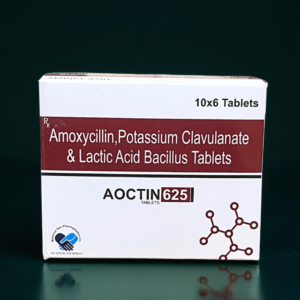Ofloxacin & Ornidazole Tablets: Uses, Benefits, Side Effects, and Precautions
Ofloxacin & Ornidazole Tablets are a combination antibiotic medication widely used to treat bacterial and protozoal infections. This combination is effective against a variety of bacterial, parasitic, and gastrointestinal infections, making it a popular choice among healthcare providers.
This comprehensive guide will cover the composition, mechanism of action, uses, dosage, side effects, precautions, and FAQs about Ofloxacin & Ornidazole Tablets.
Composition & Mechanism of Action
Composition:
- Ofloxacin: A fluoroquinolone antibiotic that works by inhibiting bacterial DNA replication, preventing bacterial growth.
- Ornidazole: A nitroimidazole derivative that acts against anaerobic bacteria and protozoa, disrupting their DNA structure and stopping their growth.
Mechanism of Action:
- Ofloxacin: Inhibits bacterial DNA gyrase, an enzyme responsible for DNA replication, leading to bacterial death.
- Ornidazole: Damages the DNA of anaerobic microorganisms and protozoa, preventing their reproduction and survival.
Together, these two components create a synergistic effect against mixed infections, providing broad-spectrum coverage against various bacterial and protozoal infections.
Uses of Ofloxacin & Ornidazole Tablets
1. Bacterial Infections:
This combination is effective against various gram-positive and gram-negative bacteria, treating infections like:
- Respiratory tract infections (bronchitis, pneumonia, sinusitis)
- Urinary tract infections (UTIs)
- Skin and soft tissue infections
- Ear, nose, and throat infections
2. Gastrointestinal Infections:
It is widely prescribed for bacterial and protozoal gastrointestinal (GI) infections, such as:
- Infectious diarrhea
- Dysentery
- Gastroenteritis
- Amoebiasis
3. Gynecological & Pelvic Infections:
- Bacterial Vaginosis
- Pelvic Inflammatory Disease (PID)
- Post-surgical infections
4. Dental Infections:
- Used to treat dental abscesses and gum infections.
5. Sexually Transmitted Infections (STIs):
- Certain sexually transmitted infections caused by anaerobic bacteria and protozoa.
Dosage & Administration
Recommended Dosage:
- Adults: 1 tablet twice daily or as prescribed by a doctor.
- Children: Not recommended unless advised by a healthcare provider.
- Duration: Generally, 5-7 days, depending on the severity of the infection.
How to Take the Tablets?
- Take the tablet with or without food.
- Swallow with a glass of water.
- Maintain a fixed schedule for better results.
- Do not crush or chew the tablet.
Missed Dose:
- If you miss a dose, take it as soon as you remember.
- Skip it if it’s almost time for the next dose.
- Do not double the dose to make up for a missed one.
Overdose:
- Overdose symptoms may include nausea, vomiting, dizziness, and confusion.
- Seek medical help immediately.
Side Effects
Like all medications, Ofloxacin & Ornidazole Tablets may cause some side effects. However, not everyone experiences them.
Common Side Effects:
- Nausea and vomiting
- Dizziness
- Stomach pain
- Loss of appetite
- Headache
Serious Side Effects (Rare but Severe):
- Allergic reactions (rash, itching, swelling of the face/tongue/throat)
- Severe dizziness
- Persistent diarrhea (could indicate Clostridium difficile infection)
- Irregular heartbeat
- Neurological issues (seizures, confusion, hallucinations)
If you experience any severe side effects, seek immediate medical attention.
Precautions & Warnings
Who Should Avoid This Medication?
- People allergic to Ofloxacin, Ornidazole, or other antibiotics.
- Patients with kidney or liver disease should use this medication cautiously.
- Pregnant and breastfeeding women should consult a doctor before using.
- Individuals with a history of seizures or neurological disorders should avoid it.
Drug Interactions:
- Avoid combining with alcohol, as it may cause nausea, dizziness, or vomiting.
- Antacids and dairy products can reduce the effectiveness of Ofloxacin.
- Blood thinners (warfarin) may have an increased risk of bleeding complications.
- Avoid with nonsteroidal anti-inflammatory drugs (NSAIDs), as they may increase the risk of seizures.
Special Considerations
1. Can It Be Used During Pregnancy & Breastfeeding?
- Pregnancy: Should be avoided unless prescribed by a doctor.
- Breastfeeding: May pass into breast milk, so consultation with a doctor is necessary.
2. Can Diabetic Patients Use This Tablet?
- Caution is required as Ofloxacin may cause fluctuations in blood sugar levels.
3. Is It Safe for Long-Term Use?
- Long-term use may lead to antibiotic resistance and severe side effects, so it should be used only as prescribed.
Frequently Asked Questions (FAQs)
1. What should I do if I experience an allergic reaction?
- Stop taking the medication and seek immediate medical attention.
2. Can I drink alcohol while taking Ofloxacin & Ornidazole Tablets?
- No, alcohol may enhance side effects like dizziness and stomach upset.
3. How long does it take for the medicine to show its effect?
- Symptoms generally start improving within 24-48 hours, but completing the full course is essential.
4. Can I take this medicine on an empty stomach?
- Yes, but taking it with food may reduce stomach discomfort.
5. What happens if I stop the medicine early?
- Stopping early may result in incomplete treatment, leading to reinfection or antibiotic resistance.
6. Can it cause diarrhea?
- Yes, some people may experience mild diarrhea, but if it is severe or persistent, consult a doctor.
7. Is it safe for elderly patients?
- Yes, but should be used cautiously in elderly patients with kidney issues.
Conclusion
Ofloxacin & Ornidazole Tablets are a potent combination used to treat bacterial and protozoal infections, especially those affecting the gastrointestinal tract, urinary system, and respiratory system. With its broad-spectrum activity, this medication plays a crucial role in treating mixed infections effectively.
However, to ensure safety and efficacy, always follow the prescribed dosage, avoid alcohol, and be aware of potential side effects and drug interactions. If you experience any serious side effects or allergic reactions, seek immediate medical attention.





